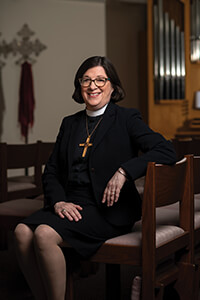God’s hope holds us
July 18, 2025
Return to your stronghold, O prisoners of hope (Zechariah 9:12).
One of Jesus’ resurrection appearances is told in Luke. Two who had followed Jesus were on their way to Emmaus. It was the first Easter, but they didn’t know that. What the two did know, and what life had taught them, was that death was final. Their Teacher and Lord was dead. Everything they had seen and felt and experienced was ended. The vision Jesus had shown them—complete, unconditional love; healed bodies and healed relationships; new life more glorious and harmonious than Eden; the redemption of the world, the whole world, all of creation—all of it was gone.
It’s a wonder that these two could pull themselves together enough to go for a walk. Many of us have experienced deep loss. I remember leaving the hospital after my father died and being bewildered that the sun was still shining, that people were going about their lives, that the world was still turning. In that moment, my world had stopped. It must have been that way for the two on the road to Emmaus. In their grief they didn’t even recognize Jesus. They said, “But we had hoped …” (Luke 24:21).
The week before Holy Week, I was in Jerusalem and the West Bank on a solidarity visit to the Evangelical Lutheran Church in Jordan and the Holy Land. The impact of the war between Israel and Hamas has been devastating. Gaza is almost completely destroyed. On Palm Sunday, the last operating hospital in Gaza was bombed. The situation in the West Bank is also dire. Tourism is a major industry in the Old City of Jerusalem, for Bethlehem and many other holy sites in Palestine. That part of the economy has come to a standstill.
Many Palestinian Christians are emigrating because they can’t see a future for themselves or their children. The pressure on Arab Christianity, once a vibrant part of the Holy Land (Mitri Raheb, a Palestinian pastor, points out that the ancestors of today’s Arab Christians may have been Jesus’ babysitters), is intolerable. Settler violence against Palestinians is a reality. When asked what he hoped to be doing in 10 years, one high school boy we met said, “Being alive.” Some people we spoke with said they no longer had hope.
Our true hope lies not in our effort but in the infinite and intimate love of God in Christ.
There are many other places in our world and in our country that experience the same hopelessness. War, fires, earthquakes, droughts, floods, disease, corruption, isolation and political changes all contribute to a feeling of helplessness. This eats away at hope. When we were younger, we had hopes and dreams for our future, for the world’s future. It’s a cliché, but the possibilities did seem endless. We made plans and set goals. Like the two on the road to Emmaus, “We had hoped.”
It is just at this point that Jesus spoke to the two on the road and opened up the Scriptures. What’s more, he sat down to dinner with them and was made known to them in the breaking of the bread. Their hope had not been realized because their hope—our hope—is too limited to know the scope and completeness of God’s hope.
God’s hope for the world breathed into the creation. God’s hope for God’s people holds us through all our rebellions and pride. God’s hope for our future is only possible in God’s hope. And when we can no longer hope, God’s hope holds us.
There is nothing in creation that can guarantee that our life and our future will work out exactly how we want. No matter how much we plan and struggle, there is no way that we can manage all the variables that life throws at us. That’s the bad news. But it is also the good news. Our true hope lies not in our effort but in the infinite and intimate love of God in Christ.
“And hope does not put us to shame, because God’s love has been poured into our hearts through the Holy Spirit that has been given to us” (Romans 5:5).



